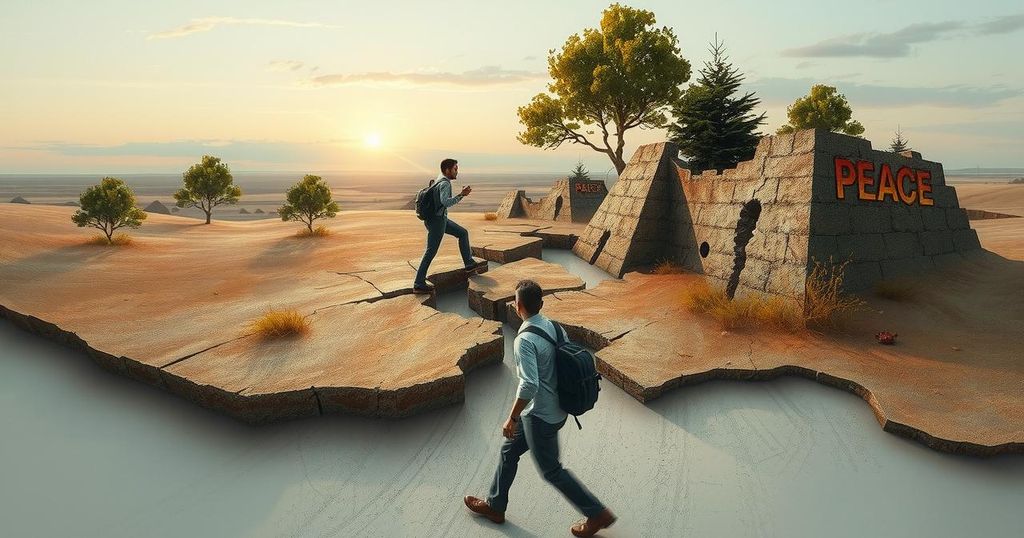Clashes in Goma, DRC, have resulted in at least 17 deaths and 370 injuries due to fighting between the military and M23 forces supported by Rwanda. The ongoing violence has worsened a humanitarian crisis, displacing hundreds of thousands. Diplomatic efforts are underway to address the situation, with significant international concern over the escalating conflict.
Recent clashes in Goma, a city in eastern Democratic Republic of Congo, have resulted in at least 17 fatalities and nearly 370 injuries, according to local hospital reports from January 27, 2025. The Congolese military has been engaged in combat with M23 forces, which are reportedly receiving support from the Rwandan army. Both gunfire and artillery were heard throughout the city, as conditions escalated with civilian casualties being reported on both sides of the border.
Residents, such as Lucie, have expressed their fear, stating, “We can hear the shooting outside our homes; we cannot leave.” The situation is dire as hospitals struggle to manage the influx of wounded civilians. Myriam Favier, head of the International Committee of the Red Cross in North Kivu, has indicated that the majority of the injured are non-combatants. The ongoing violence has displaced over 400,000 individuals since the beginning of the year, further exacerbating the humanitarian crisis.
The M23 claimed responsibility for advancing into Goma and announced their intention to liberate the city, demanding the surrender of Congolese military forces. An emergency summit involving Congolese President Felix Tshisekedi and Rwandan President Paul Kagame is scheduled for January 29, 2025, to address the escalating tensions. The situation has drawn international concern, with U.S. Secretary of State Marco Rubio emphasizing the need for dialogue between the two nations.
In addition to military disruptions, a mass jailbreak occurred during the clashes, leading to further security concerns within Goma. Reports indicate that some Congolese military units have begun to surrender, handing their arms to UN peacekeepers. Tragically, Rwandan military sources have reported civilian casualties across the border, highlighting the cross-border ramifications of the conflict.
Congolese Foreign Minister Therese Kayikwamba Wagner has condemned the presence of Rwandan soldiers in Goma, labeling it a “declaration of war.” She has urged the United Nations Security Council to implement sanctions against Rwanda for its involvement. Both DRC and Rwanda have withdrawn their diplomats from each other’s capitals, indicating a further deterioration in relations amidst ongoing violence and instability in the region.
The eastern Democratic Republic of Congo has been engulfed in conflict for over three decades, primarily fueled by internal strife and cross-border violence. The M23 rebel group has emerged as a significant threat, reviving its operations in late 2021 after a period of dormancy. Allegations have been made against Rwanda, suggesting it seeks control over valuable mineral resources within the DRC, a claim that Rwanda denies vehemently. The ongoing violence has caused severe humanitarian impacts, with vast numbers of civilians displaced and casualties on multiple fronts. Amid this escalating situation, international attention has heightened, with calls for negotiations and interventions from various countries, including the United States. The geopolitical dynamics between DRC and Rwanda remain fraught, marked by mutual accusations and historical tensions that continue to influence the region’s security landscape.
In summary, the recent violence in Goma has claimed numerous lives and exacerbated an already critical humanitarian crisis. The involvement of Rwandan forces and the M23 has heightened tensions, leading to calls for urgent international intervention. The upcoming diplomatic meetings between DRC and Rwanda leaders could prove pivotal in addressing the conflict and restoring stability in the region.
Original Source: www.thehindu.com






